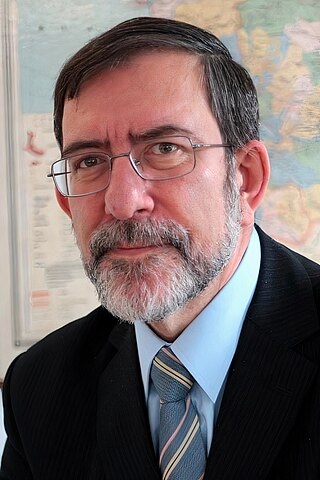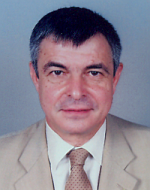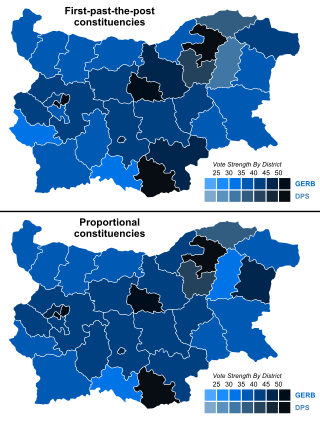
The politics of Bulgaria take place in a framework of a parliamentary representative democratic republic, whereby the prime minister is the head of government, and of a multi-party system. Executive power is exercised by the government. Legislative power is vested in both the government and the National Assembly. The Judiciary is independent of the executive and the legislature.

The Movement for Rights and Freedoms is a centrist political party in Bulgaria with a support base among ethnic minority communities. It was a member of the Liberal International and the Alliance of Liberals and Democrats for Europe (ALDE). While representing the interests of Muslims, especially Turks and to a lesser extent Pomaks, the party also receives the largest share of Romani votes.

The Union of Democratic Forces is a political party in Bulgaria, founded in 1989 as a union of several political organizations in opposition to the communist government. The Union was transformed into a single unified party with the same name. The SDS is a member of the European People's Party (EPP). In the 1990s the party had the largest membership in the country, with one million members, but has since splintered into a number of small parties totaling no more than 40,000 members. The SDS proper had 12,000 members in 2016.

Philip Dimitrov Dimitrov is a Bulgarian politician, Prime Minister of Bulgaria 1991–2, MP in the 36th (1991–1994), 37th (1994–1997) and the 40th (2005–2007) National Assembly, and MEP from January 2007 to May 2007.
Democrats for a Strong Bulgaria is a political party in Bulgaria established by former Bulgarian Prime Minister Ivan Kostov (1997–2001).
The Green Party is an environmentalist political party in Bulgaria. It was founded in Sofia in 1989 by Aleksandar Karakachanov, who later went on to become the chairperson of the party.

Stefan Antonov Sofiyanski is a Bulgarian politician who served as interim Prime Minister of Bulgaria in 1997 and was a three-term Mayor of Sofia. He was a leading member of the Union of Democratic Forces.

Veselin Metodiev Petrov is a Bulgarian politician, member of Parliament & deputy chairman of Democrats for a Strong Bulgaria. He was Deputy Prime Minister and Minister of Education from 1997 until 1999 under Prime Minister Ivan Kostov.

The eighty-ninth cabinet of Bulgaria, also known as the Three-party coalition cabinet and the Stanishev Government, ruled from August 17, 2005, to July 27, 2009. The cabinet was formed with the coalition of the three leading at that time: BSP, NDSV and DPS, in order of their parliamentary representation. Their parliamentary representation also determined the number of cabinet appointments.

Parliamentary elections were held in Bulgaria on 5 July 2009. With 40% of the vote, the decisive winner of the elections was the established in 2006 personalistic party of Boyko Borisov, GERB. The Socialist Party, in power before the election, was in second place, with around 18%. Оnce-ruling National Movement Simeon II did not cross the 4% threshold and won no seats. The turnout was 60.6%, one of the lowest ever. Following the election, GERB leader Boyko Borisov became prime minister. Just like all the previous parliamentary elections since the fall of communism, the government was not re-elected.
The Blue Coalition was a centre-right electoral alliance in Bulgaria, whose members were the Union of Democratic Forces (SDS), Democrats for a Strong Bulgaria (DSB) and three smaller parties. The members of the European Parliament elected on the coalition's list sat with the group of the European People's Party.

Nadezhda Neynsky, previously known as Nadezhda Nikolova Mihaylova, is a Bulgarian politician and diplomat. A former leader of the Union of the Democratic Forces, she served as the Minister of Foreign Affairs and as a Member of both the National Assembly and the European Parliament. She was most recently the Bulgarian Ambassador to Turkey.
Conservative Bulgaria, previously known as National Front for the Salvation of Bulgaria, is a national conservative political party in Bulgaria.

Ivan Yordanov Kostov is a Bulgarian politician who served as Prime Minister of Bulgaria from 1997 to 2001. A member of the SDS party, which he led from 1994 to 2001, he was previously Minister of Finance from 1990 to 1992. Following his premiership, Kostov founded a new political party, the DSB, and served as Member of the National Assembly from 2001 to 2013.

Plamen Vasilev Oresharski is a Bulgarian politician who served as Prime Minister of Bulgaria from 2013 to 2014. Affiliated with the Bulgarian Socialist Party, he previously served as Member of the National Assembly from 2009 to 2013, Minister of Finance from 2005 to 2009 and Deputy Minister of Finance from 1997 to 2001.

Parliamentary elections were held in Bulgaria on 5 October 2014 to elect the 43rd National Assembly. GERB remained the largest party, winning 84 of the 240 seats with around a third of the vote. A total of eight parties won seats, the first time since the beginning of democratic elections in 1990 that more than seven parties entered parliament. Boyko Borisov then became prime minister as head of a coalition with the Reformist Bloc and with outside support from the Patriotic Front and the Alternative for Bulgarian Revival.

Radan Milenov Kanev is a Bulgarian politician who is currently a Member of the European Parliament. A member of the DSB party, which he led from 2013 to 2017, he previously served as Member of the National Assembly from 2014 to 2017.
Yes, Bulgaria!, is a Bulgarian political party, founded in January 2017 by former Minister of Justice Hristo Ivanov. Yes, Bulgaria! is part of an electoral alliance with the Democrats for a Strong Bulgaria called Democratic Bulgaria.
Democratic Bulgaria is a political alliance in Bulgaria. Founded on 12 April 2018 as an electoral alliance between three political parties – DaB, DSB and the Green Movement, it merged into PP-DB in 2023. In April 2024 the Green Movement left PP-DB. DaB and DSB maintain close relations and brand themselves as "Democratic Bulgaria".

Stand Up.BG or Stand Up Bulgaria is a Bulgarian non-governmental organization and political party which was founded by Maya Manolova on December 6, 2019.














